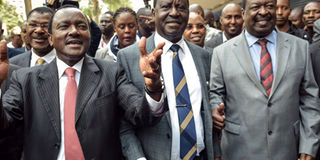Kenya’s new post-election dilemma

Kenyan opposition leaders at the supreme court ahead of the ruling on Friday in Nairobi. On Friday September 1, the Supreme Court of Kenya stunned the country and much of Africa with its ruling.
PHOTO BY AFP
What you need to know:
- Second chance. Having come this close to the presidency, it is now going to be impossible for Raila Odinga and his supporters to accept any other result than one that declares him president in two months’ time, Timothy Kalyegira writes.
On Friday September 1, the Supreme Court of Kenya stunned the country and much of Africa.
It announced that the presidential election of August 8 was void and a fresh presidential election should be held within 60 days.
In Eldoret, crowds stood in silence by the roadside still trying to take in what they had just heard.
In Kisumu, Nairobi and Mombasa, huge crowds thronged the streets celebrating with such ecstasy. One might have thought Raila Odinga had been declared the winner of the presidential election.
Kisumu and Mombasa are strongholds of the opposition Nasa coalition. Eldoret and towns like Nyeri, Nakuru and Meru are strongholds of the ruling Jubilee party.
What happens next is anyone’s guess. This is a testing time for Kenya as nothing else it has ever faced since independence.
To millions of long-term Odinga supporters, the ruling by the supreme court simply brings to an end years of what they regard as presidential elections being stolen from the veteran politician.
This annulment of the August 8 election is the closest that Odinga has ever come and will ever come to his dream of being Kenya’s president.
Having come this close to the presidency, it is now going to be impossible for Odinga and his supporters to accept any other result than one that declares him president in two months’ time.
If Uhuru Kenyatta is once again declared president, then we might witness the kind of post-election violence that followed the December 2007 general election.
That is the crisis that now faces the most important country in East and Central Africa.
Once again, we see the political and ethnic polarisation of Kenya.
Kenyan politics tends to be structured around ethnic alliances. The demographics of 2017 show the Kenyatta and his Jubilee party with the slight majority.
If there was a high voter turnout for Jubilee in the August 8 election, we can be sure that this time voter turnout will hit 90 per cent and over.
Odinga’s supporters will also see to it that they turn out in huge numbers.
Going by the ethnic numbers, Kenyatta and his running mate William Ruto should be able to win again. But the question is: Who will believe that they have won fairly?
To prevent a national bloodbath or even months of protests and possibly civil war from erupting after the second presidential election, the tallying of votes will have to be as transparent and flawless as that in a European election.
But even then, that will not be enough. Kenya’s media, religious leaders, political class, academia and foreign diplomats in Kenya will have to find a way of persuading the losing side of the fact that they really did lose fairly and squarely.
Which Odinga supporter will accept that Kenyatta has won yet again?
And if he does indeed win again, what will Kenyans think of the time and money spent for a second presidential election, only to get the same result once again?
Just think of how expensive Kenyan general elections are.
Both campaigns must now crisscross the country for another gruelling two months, which means that the total bill for both the earlier campaign and this second campaign will come to an unheard-of figure.
Think of the bitterness that the losing side will feel this second time around. Also, will all the presidential candidates who contested on August 8 be allowed to run again or is it in essence a run-off between Kenyatta and Odinga?
As for media coverage, journalists from all over the world will descend on Kenya in greater numbers than they did in 2013.
It is going to be the election that almost all of Africa watches with keen interest.
The only way I see out for Kenya in this new post-election crisis is that a government of national unity is not only created but becomes a permanent reality in Kenya’s constitution.
This unprecedented ruling is already reverberating across Africa. Ruling parties are going to enter elections feeling much more nervous than they usually are.
Supreme courts will feel just a little more emboldened to examine the petitions of the losing sides in more detail than the usual bland statements about the irregularities not having significantly changed the reality of the voting pattern.
The more one reflects on this situation, the more one sees a crisis of such magnitude as has not been seen in Africa since the dawn of independence in the 1950s.


